ISSN: 1941-4137
POETRY THAT ENACTS THE ARTISTIC AND CREATIVE PURITY OF GLASS
POETRY THAT ENACTS THE ARTISTIC AND CREATIVE PURITY OF GLASS

Emma Cairns Watson studied neuroscience and English literature at Smith College and now uses none of that training in her current job coordinating Egyptology conferences. Her work has appeared in RHINO, Pithead Chapel, Barrelhouse Online, Half Mystic, and Ninth Letter, among others. She lives and writes and spoils two dogs in Los Angeles.
The smoke and what burned to make it
My mother’s best friend calls our house
to say she will not be going outside any more.
During fires, the death count is only the people they find dead;
afterward it’s everyone they can’t find living. So the numbers
rise like smoke. If you cannot find somebody it means
they might already have found you; ash lazies over the whole world.
My mother’s best friend seals her fireplace and cancels Amazon
because the packages are just piling up on her porch. She wears a mask
even in the house. She is one of those people
who does not want to fill up her body with the dead.
I never thought of it like that, but I don’t need dead people
in the air to keep me from going places. I’ve always stayed put.
They say, where there’s smoke — but the winds carry it so far
away, to places they’ve never heard of fire. Even my lover
plumbing ice cores up north calls to say that she can smell it.
We end up in a fight about lakes. She wants me to move to Alaska;
to entice me sends a picture of a lake there as large as the world.
I tell her I mistrust large bodies of fresh water, as in
how did they get that big without being oceans? This seems suspicious.
This is very upsetting for my lover, who says You don’t believe in glaciers?
A mile-thick layer of ice was stranded, melted, formed a lake. Everybody knows that.
I believe in them, I just think after they melt they should find an ocean to be part of.
She says, It’s not the little glacier’s fault that the big glacier left it behind.
It wanted to go with the big glacier. It just got stuck. Then the latest blizzard
takes out the connection, which is a much better reason not to move there from California,
fires and all. When the research station phones come online again
two days later, I get a message that just says I wanted to make you feel sorry
for glacial lakes. What she really wants is me
light enough for winds to carry like that.
She says, even the dead come north to me, but you won’t.
It isn’t that my mother doesn’t mind breathing the dead,
she just doesn’t think about it. She’d rather go out into her garden
and work than worry. When I tell my lover I need to be like her
but need shelter more, she says when the fires started they told people to shelter in place
in places that are gone now. Anyway she is off to go ice-skating
and when new fires start I’m welcome to join her, ashes or not.
“Smoke and what burned to make it” was one of my attempts to respond to this past winter’s devastating Los Angeles fires. I wanted to explore both the concept of fire clearing a way for new life as well as my own discomfort with the idea that destruction is a prerequisite for growth. I found a way in with these four women’s perspectives on loss, commitment, change, and the kind of fear that can make you cling to known evils and keep a painfully tight grasp on the bird in the hand.
Glass: A Journal of Poetry is published monthly by Glass Poetry Press.
All contents © the author.
All contents © the author.





